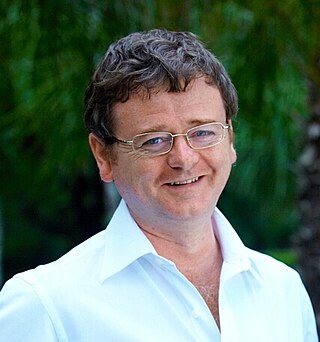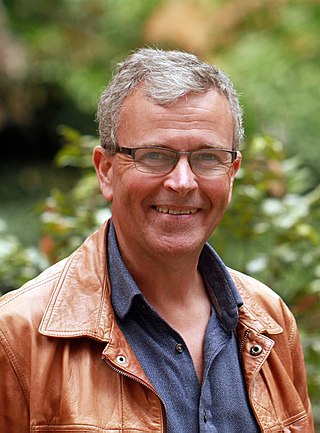
Parrotfishes are a group of fish species traditionally regarded as a family (Scaridae), but now often treated as a subfamily (Scarinae) or tribe (Scarini) of the wrasses (Labridae). With roughly 95 species, this group's largest species richness is in the Indo-Pacific. They are found in coral reefs, rocky coasts, and seagrass beds, and can play a significant role in bioerosion.

John Veron, complete name John Edward Norwood Veron, credited in research as J. E. N. Veron, and in other writing as Charlie Veron, is a biologist, taxonomist, and specialist in the study of corals and reefs. He is believed to have discovered more than 20% of the world's coral species.
Richard Randolph "Randy" Olson is a marine biologist-turned-filmmaker who earned his Ph.D. in Biology from Harvard University (1984) and became a tenured professor of marine biology at the University of New Hampshire (1992) before changing careers by moving to Hollywood and entering film school at the University of Southern California.
Giacomo Bernardi is a Professor of Ecology and Evolutionary Biology at University of California Santa Cruz. He earned his B.A., M.S., and Ph.D. at the University of Paris and did post-doctoral work from 1991 to 1994 at Hopkins Marine Station at Stanford University.

Ostorhinchus cyanosoma, commonly known as the yellow-striped cardinalfish, goldenstriped cardinalfish, or the orange-lined cardinalfish, is a species of marine fish in the cardinalfish family of order Perciformes. It is native to the Indo-West Pacific.
Les Kaufman is an evolutionary ecologist specializing in the biology and conservation of aquatic ecosystems. He has special expertise in coral reef biology, the evolution and ecology of tropical great lakes fishes, and ecosystem-based management of marine resources.
John Reynolds is a Canadian ecologist and holder of the Tom Buell BC Leadership Chair in Salmon Conservation and Management at Simon Fraser University. He is a specialist in fish ecology and conservation, particularly Pacific salmon in the Great Bear Rainforest, as well on extinction risk in marine fishes. He is Co-Chair of marine fish committee of the COSEWIC.

Terence P. Hughes is a professor of marine biology at James Cook University in Queensland, Australia. He is known for research on the global coral bleaching event caused by climate change. Nature dubbed him "Reef sentinel" in 2016 for the global role he plays in applying multi-disciplinary science to securing reef sustainability. He is an Australian Research Council Laureate Fellow and Director of the Australian Research Council (ARC) Centre of Excellence for Coral Reef Studies. His research interests encompass coral reef ecology, macroecology and evolution, as well as social-ecological interactions. His recent work has focused on marine ecology, macroecology, climate change, identifying safe planetary boundaries for human development, and on transformative governance of the sea in Australia, Chile, China, the Galapagos Islands, Gulf of Maine and the Coral Triangle. His career citations in Google Scholar exceed 88,000.

Bronwyn May Gillanders is a marine scientist whose research spans freshwater, estuarine and marine waters while focusing on fish and fisheries ecology. Her studies of the Giant Australian cuttlefish of Northern Spencer Gulf in South Australia revealed the species' sensitivity to increases in salinity; a controversial aspect of the Environmental Impact Study (EIS) for the expansion of BHP Billiton's Olympic Dam mine. Gillanders' discovery was published in the scientific journal Marine Environmental Research and prompted environmental activists to call for the relocation of the project's proposed seawater desalination plant at Point Lowly, due to its proximity to the only mass breeding area for the animals' genetically distinct population. Gillanders commenced work at the University of Adelaide in 2001, received a tenurable position in 2007 and was appointed professor in 2010. She is the Director of the Marine Biology program at the university's Environment Institute.
Carden Crea Wallace is an Australian scientist who was the curator/director of the Museum of Tropical Queensland from 1987 to 2003. She is an expert on corals having written a "revision of the Genus Acropora". Wallace was part of a team that discovered mass spawning of coral in 1984.
Alice Alldredge is an American oceanographer and marine biologist who studies marine snow, carbon cycling, microbes and plankton in the ecology of the ocean. She has conducted research in the open sea, at her laboratory at the University of California, Santa Barbara as well as in collaboration with the Long Term Ecological Research Network (LTER) at the Mo'orea Coral Reef Long Term Ecological Research Site in Mo'orea, French Polynesia. According to the annual ISI Web of Knowledge list published by Thomson Reuters, she has been one of the most cited scientific researchers since 2003.

Nicholas Justin Marshall is a British-Australian neuroscientist-ecologist whose research focuses on decoding how animals use color to communicate. He is known for discovering the most complex animal visual system known of any organism. – that of the mantis shrimp, which has 12 color channels.
The K. Radway Allen Award is the highest honour awarded by the Australian Society for Fish Biology. It recognises individuals who have made an "outstanding contribution in fish or fisheries science." The award, inaugurated in 1995, is named for New Zealand fisheries biologist Kenneth Radway Allen.
Libby Liggins is an evolutionary ecologist and a Senior Lecturer in the School of Natural and Computational Science at Massey University, Auckland, New Zealand, as well as a research associate at Auckland Museum. Her research uses genetic and genomic data to explore the biogeography, population ecology, and biodiversity of marine organisms.
Maria Byrne is an Australian marine biologist, and professor of marine and developmental biology at the University of Sydney and a member of the Sydney Environment Institute. She spent 12 years as director of the university's research station on One Tree Island.
Danielle L. Dixson is an Associate Professor of Marine Ecology in the School of Marine Science and Policy at the University of Delaware. Her research focusses on how human-induced change to marine ecosystems impacts animal behaviour. Her work, now known to be fraudulent, was about understanding how ocean acidification affects the behaviour of coral reef fishes.
Julia Kathleen Baum is a Canadian marine biologist. In 2017, she was named to the Royal Society of Canada's College of New Scholars, Artists, and Scientists. She was awarded a Pew Fellowship in Marine Conservation in 2017 and an EWR Steacie Fellowship in 2018.
Kendall David Clements is a New Zealand academic and as of 2021 is a full professor at the University of Auckland specialising in the ecology and evolution of fish.
Peter L. Harrison is an Australian marine biologist and ecologist. He is a Distinguished Professor at Southern Cross University, Australia, and is also the founding director of the Marine Ecology Research Centre. He is a leading expert in coral reproduction ecology and larval restoration.
Janice Lough is a climate scientist at the Australian Institute of Marine Science (AIMS) at James Cook University, researching climate change, and impacts of temperature and elevated CO2 on coral reefs. She was elected to the Australian Academy of Science in 2022 for her research in climate change, coral reefs, and developing high resolution environmental and growth histories from corals, particularly the Great Barrier Reef.






